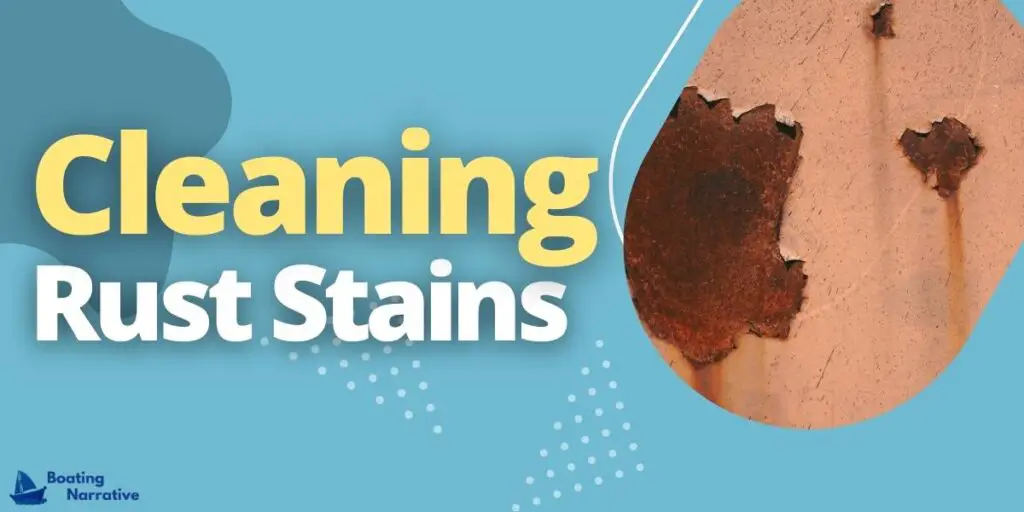Hull cleaning is something that most boaters know little about. But, if you’ve ever tried cleaning your vessel’s hull, you know exactly what I’m talking about.
If you’ve ever gone boating, you’ve probably noticed that your vessel’s hull is dirty when you get back to shore. Unfortunately, you have to come to terms with this, but most boaters don’t know the best way to clean their vessel’s hull.
In this article, I will teach you what the best way is to clean your vessel’s hull and why it’s important to do so.

Here’s An Answer To How You Can Clean Your Boat’s Hull:
Cleaning your boat’s hull is an important step in keeping your vessel in good condition. Cleaning the hull will remove built-up algae, fish scales, and other biological growth.
Cleaning the hull is easily done with a standard garden hose. You can use a brush to scrub off stubborn grime, but you should stay away from any harsh cleaners, as the corrosive chemicals may damage the paint.
General Tips for Cleaning a Boat Hull
- Always clean the hull before cleaning any other surfaces on your boat.
- Start by rinsing the hull with fresh water to remove any salt, dirt, or debris.
- Use a mild soap or boat cleaner to scrub the hull, especially in areas where barnacles or other marine growth may be present.
- Rinse the hull thoroughly with fresh water.
- Use a Garden Hose to clean your boat’s hull – use gentle cleaners and avoid scrubbing with hard brushes or excessive water pressure, which can damage the paint finish.
- Avoid harsh cleaners as they may damage painted surfaces. Use a mild biocide cleaner such as bleach instead if you choose to scrub off algae or built-up growth.
- Use caution when using a pressure washer to avoid damaging the vessel’s hull.
- Keep the hull clean by regularly cleaning it with a garden hose and using a mild biocide cleaner such as bleach. This will keep your yacht in good shape and prevent rust.
- Always rinse the boat after cleaning to remove all of the cleaners – do not leave water standing on decks or hulls for long periods as this can cause rusting.
- A boat wax or polish can be applied to the hull to protect it from the weather and make it easier to clean the next time around.
The Different Types of Hull Cleaning Methods

There are three main hull cleaning methods: manual, chemical, and mechanical.
- Manual hull cleaning is the least expensive and most common method. It involves using a brush or scraper to remove the growth from the hull.
- Chemical hull cleaning involves using a biocide to kill the growth on the hull. This method is more expensive than manual hull cleaning, but it is less labor-intensive.
- Mechanical hull cleaning is the most expensive and labor-intensive method. It involves using a machine to remove the growth from the hull.
Cleaning Waterline Stains
If you notice stains on your boat’s hull near the waterline, it’s important to clean them as soon as possible. Scum, mold, and dirt are just a few things that can produce stains.
There are a few different ways to clean waterline stains, depending on what type of stain. A boat owner can use a cleaning solution and sponge or microfiber towels for general dirt and grime.
For tougher, more stubborn stains, harsher chemicals may be necessary.
The best place to get help cleaning your yacht is at a marina or boatyard. The professionals there can recommend the best materials and procedures for cleaning your hull.
Barnacles Cleaning
Barnacles are a common nuisance for boat hulls. They can attach themselves to the bottom of your boat and cause fouling, leading to pollutants and a loss of performance.
A good hull cleaner will remove barnacles and other fouling from your hull, gel coat, and fiberglass boat. Many hull cleaners are on the market, but not all are created equal.
Some hull cleaners are more versatile than others, and some are better at removing barnacles and other fouling. Marine citrus cleaners are a good choice for hull cleaning because they are versatile and can be used on hulls.
It is important to clean the bottom of your boat regularly to prevent barnacles and other fouling. Barnacles can attach themselves to the hull and cause fouling, leading to pollutants and a loss of performance.
A good hull cleaner will remove barnacles and other fouling from your hull, gel coat, and fiberglass boat. Many hull cleaners are on the market, but not all are created equal.
Some hull cleaners are more versatile than others, and some are better at removing barnacles and other fouling. Marine citrus cleaners are a good choice for hull cleaning because they are versatile and can be used on hulls.
Cleaning Rust Stains

Cleaning rust stains from the hull of your vessel can be difficult, but it is important to do this regularly to maintain the integrity of your boat. There are a few different ways to clean rust stains, but each has pros and cons.
- One way to clean rust stains is with harsh chemicals. These chemicals can be effective at removing rust, but they can also be dangerous to the environment and your boat. To keep your boat safe, be sure to read and follow the instructions on the labels.
- Another way to clean rust stains is with an active ingredient called muriatic acid. This acid effectively removes rust, but it can also damage your boat if it is not used correctly. Use the product just as directed and only on certain parts of your body.
- Finally, you can also clean rust stains with a regular cleaning product. Although less successful, this approach is better for the environment and your boat than the other two. To ensure that a product is safe for use on a boat, read the label thoroughly.
Cleaning Salt Stains
Cleaning salt stains can be a difficult and time-consuming task, but it is important to maintain the hull of your vessel. Here are a few tips on how to effectively clean salt stains:
- Wash the entire boat regularly with fresh water to prevent salt buildup and stains.
- In the sea climate, mold and mildew can quickly grow up, so be sure to clean any places that appear to be affected.
- If salt stains are already present, you can use a mild cleaning solution and a soft brush to scrub them away.
Your boat’s hull will last longer and look better if you follow these suggestions.
What Are the Risks of Leaving Water Standing on A Boat’s Hull?
Leaving water standing on a boat’s hull can lead to several problems, including:
- Growth of aquatic plants and animals
- Staining and discoloration
- Corrosion
- The deterioration of the hull’s paint or gel coat
- Deterioration of the hull itself
Kind of Cleaners Used To Clean The Hull Of Boat

Many different cleaners can be used to clean the hull of a boat. Some of the most common cleaners used are pressure washers, brushes, and chemicals. Each type of cleaner has its own set of pros and cons.
- Pressure washers are often used because they effectively remove dirt and grime. However, they can also damage the hull if not used properly.
- Brushes are another popular option because they are gentle and effective. However, they can take longer to use than other cleaners.
- Chemicals are often used to clean the hulls of boats because they effectively remove tough stains. These devices can, however, be hazardous if not used properly.
Cleaning The Inside of A Boat Hull
To clean the inside of a boat hull, you will need to remove all of the furniture and carpeting. Before using either a vacuum or power washer, be sure that the surface is clean.
Start at the top of the hull and work your way down, making sure to rinse the area afterward. Dirt and grime that have accumulated over time must be removed before you begin cleaning.
You can do this by scrubbing the hull with a brush or a sponge. You can also use a power washer to remove any tough stains. The hull of a ship should be cleaned to the farthest extent. You can also use a boat hull cleaner.
Manual Hull Cleaning vs. Chemical Hull Cleaning
Manual hull cleaning is a great option for when you don’t have access to a power washer. The hulls of small boats can also be cleaned using this tool.
The main downside of manual cleaning is that it can be time-consuming. Additionally, manual cleaning isn’t as effective at removing dirt and grime as chemical cleaners are.
A Boat Hull Cleaning Checklist
- Clean the hull of your vessel at least once a month.
- Inspect your hull regularly for barnacles, algae, and other marine growth.
- If you see any growth on your hull, use a soft brush to remove it.
- Use a soft brush and a mild soap to avoid scratching the hull.
- Rinse the hull thoroughly after cleaning.
- Make that the hull is free of holes or cracks.
- Apply a hull protector after cleaning to help prevent marine growth.
- Freshen up the hull by applying a new layer of wax after being cleaned.
Time Taken to Clean a Boat Hull
Several things influence the answer to this question, including the size of your boat and the type of hull you have. For example, a fiberglass hull will take less time to clean than a hull made of wood or aluminum.
You may expect to spend at least an hour cleaning your hull in the usual case. Cleaning a boat hull is a necessary part of boat ownership.
Aside from the aesthetic benefits, it also aids in the prevention of algae and other organisms from growing on your boat’s hull.
However, if you don’t want to do it yourself, you may always hire a professional. Many boat owners do this regularly, especially if they don’t have the time to do it themselves.
There are also boat hull cleaning services that will come to your dock and clean your hull.
Dangers of Not Cleaning a Hull Properly

One of the dangers of not cleaning a boat hull properly is the growth of bacteria and other microorganisms. Both humans and animals can become sick from these, and it can also degrade the boat hull itself.
Another danger is the accumulation of pollutants on the hull, eventually leaching into the water and harming the environment.
Additionally, if the hull is not cleaned regularly, it will become more difficult to clean and require more effort and expense to maintain.
Cost to Clean The Hull of Your Vessel
Maintaining a clean vessel is critical, but how much does it cost to have someone clean the hull of your vessel? According to Boats.com, “the average cost of a hull cleaning is $200 to $400.”
It’s possible to pay anywhere from $100 to $600, depending on the size of your vessel and the type of hull. If you have a sailboat, the cost may be higher because of the time it takes to clean the hull.
If you consider having your hull cleaned, getting quotes from different companies is important. Additionally, you should inquire about the hull-prior cleaner’s experience. Finally, it is important to find a company you trust to do a good job.
Final Thoughts
Keeping your vessel clean is essential for its long-term health and performance. In this blog post, we did discuss the best way to clean your hull, focusing on the various methods and why each one is effective.
We also provided tips on making sure that your hull is properly cleaned and maintained to maximize its efficiency and minimize the chances of hull failure. Make sure to clean the hull regularly to keep it in good shape!

